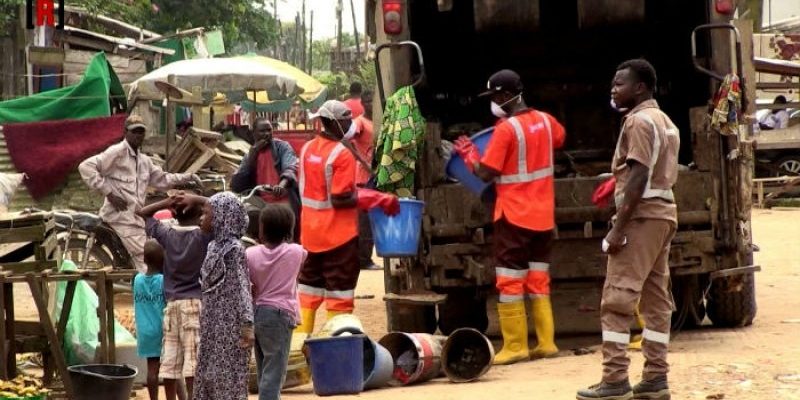The Covid-19 pandemic affecting Africa is forcing people to confine themselves. To meet the needs of families confined to their homes, companies providing essential services such as water, electricity and waste management are stepping up their efforts to adapt to the situation.
It’s 7 a.m. in Biyem-Assi, a popular neighbourhood in the city of Yaoundé, Cameroon. That morning, the population wakes up timidly after heavy rain falls in the city. On one of the hills of the Biyem Assi neighbourhood, the loud honking of car horns can be heard. This persistent noise signals the arrival of the truck of the Cameroonian Hygiene and Sanitation Company (Hysacam), which provides waste management in several towns in the country.
Men, women and children go out and pile up at the side of the small unpaved road, equipped with their rubbish bags. Since the beginning of the health crisis caused by the Covid-19, the passage of Hysacam’s trucks is more and more frequent. The households of Biyem Assi usually dump their waste into the small river that runs between the compound. The garbage dumpster being installed several kilometres away. In Cameroon, as elsewhere in Africa, public utilities are adapting to the new pace caused by restrictions on the movement of people.
Waste treatment at the Sidi Bouzid isolation centre in Tunisia
The pace has also accelerated in waste collection in Algeria. In the wilaya of Algiers, the Extranet company doubled waste collection patrols during the day, while maintaining night patrols at 8 p.m. and 11 p.m. In addition, the company says it has put into service its entire fleet of 315 tipper trucks that collect 1,700 tonnes of waste per day in the 30 districts of Greater Algiers.
The waste collection service is also being strengthened in Tunisia. The government of this other North African country has set up a system for treating medical waste from the Covid-19 compulsory isolation centre for patients in Sidi Bouzid. The management of this system has been entrusted to a private company. After collection, the waste is disinfected and then transported to a hazardous waste treatment plant.
Free water
“Wash your hands with clean water and knowledge.” This is one of the measures taken to limit the spread of coronavirus. Unfortunately, however, this protective gesture is not available to everyone in Africa. The United Nations World Water Development Report (2019) indicates that in sub-Saharan Africa, only 24% of the population has access to a safe source of drinking water.
To facilitate handwashing, some African States have temporarily made water from the network free of charge. This is the case in Togo, where this measure has been in force since the beginning of April 2020. The government of Ghana has taken a similar decision, as has the Gabonese government, which distributes water via flatbed trucks in areas of the capital Libreville not served by the network.
In Côte d’Ivoire, the authorities have decided to postpone water bills for all households from April and May 2020. The April payment deadline has been extended to July 2020, and the May to August 2020 deadline has been extended to July 2020. This measure affects more than one million households, i.e. more than 6 million Ivorians.
Meanwhile, the energy and water company of Gabon (Seeg) set up the “Clean Hands” operation in a few days: water and a hand washing booster were distributed to people living in the underprivileged neighbourhoods of the Gabonese capital.
Difficulties in the electricity supply
In Côte d’Ivoire, the postponement of bill payment deadlines also concerns electricity. “People have an additional three months to pay these bills. This measure means that no penalties will be applied to customers, and there will be no suspension of electricity supply due to unpaid bills from today (April 1, 2020) until these new payment deadlines. Moreover, the settlement of these bills can be made, in several payments, over the deferral period,” said Abdourahmane Cissé, the Ivorian Minister of Petroleum, Energy and Renewable Energy, in early April.
Beyond the measures taken by the authorities to reduce household expenses, the national electricity networks are becoming less efficient with the populations confined to their homes. In major cities in several African countries, national media report on load shedding and the application in some cases of neighbourhood rotations in electricity supply.
It is in this context that the government of Nigeria has decided to install solar hybrid systems to reduce the effects of load shedding in the Covid-19 patient care centres. Mini-solar hybrid power plants have been installed by the Rural Electrification Agency (REA) of Nigeria at the health centres for people infected with the new coronavirus in the Federal Capital Territory, Lagos State and Ogun State in south-western Nigeria.
Initial impacts of Covid-19 on renewable energy production in Africa
For the time being, specialists have not yet estimated the consequences of the Covid-19 pandemic on renewable energy production in Africa. According to the Norwegian consulting firm Rystad Energy, solar and wind projects will be suspended in 2020, “creating a ripple effect in the coming years as currencies around the world continue to plummet against the US dollar”. According to the same source, some companies are choosing to halt project development by contracting for key components, which are typically purchased in US dollars.
Covid-19, for example, affects Ncondezi Energy, which recently suspended its project to build a solar system for a company in Mozambique. With an expected capacity of 400 kW, the project is being developed in partnership with GridX Africa, a supplier of solar and electricity storage solutions for companies in sub-Saharan Africa.
Meanwhile, Winch Energy wants to provide easy-to-deploy containerized clinics powered by solar energy.
Jean Marie Takouleu





